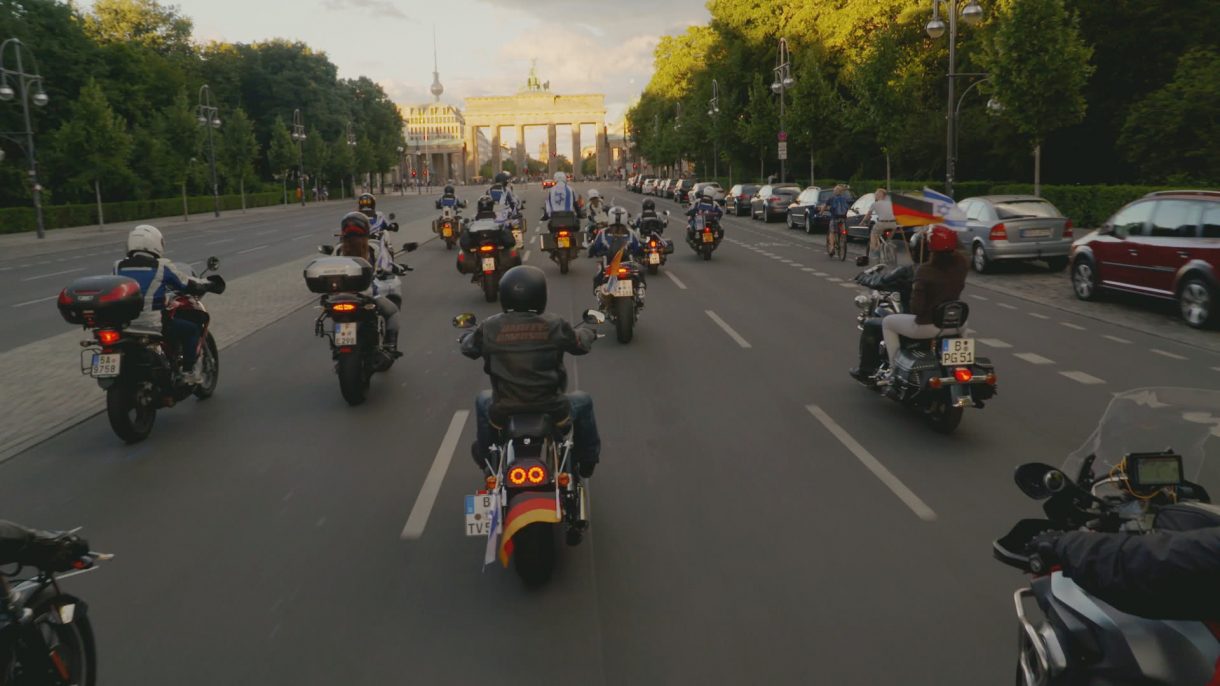
Dir.: Catherine Lurie; Documentary; UK/Bulgaria/Czech Republic/Germany/Greece/ Hungary/ Israel/ Poland/ Romania/Slovakia 2018, 75 min.
Catherine Lurie produced, directed and scripted this lively re-imagining of the first Maccabiah biker rally in the early 1930s. It saw Jewish motorcyclists from Palestine (then a British Mandate), taking to the road to counter growing Anti-Semitism in Europe, urging Jews to compete in the Maccabiah of 1938, a Jewish Olympiad, which never went ahead.
This 2015 version involved eleven male and female rides who completed the 4500 km in 22 days. Their odyssey started in Israel and went via Greece, Bulgaria, Romania, Hungary, Slovakia and Poland, eventually fetching up in Berlin where the 2015 Maccabiah would be held in the grounds of the infamous 1936 Olympic Games.
Nine Israelis and two Jews from the Diaspora made up the marathon. Israeli architect Gal Marom (49) took part in honour of his grandfather Solomon Adir, who was one of the original riders in 1935, visiting Canada and the USA. “This journey allowed me to close my personal circle in memory of my grandfather”. Most moving is the interaction between Yoram Maron (78), a holocaust survivor, and his son Dan (48). Dan has never heard his father talk about the gruesome memories of the camps – this is common amongst many who saw active service, rarely relating the grim events to their children. Some don’t even mention their escape from the Holocaust. Dan understands his father: ”He wanted to afford me the innocence he never experienced, and I will do the same with my own children.” Dan’s mother Irena and her husband were taken from Zloczow Ghetto in 1943, and put into overcrowded cattle trains to Belzec extermination camp. When one of the prisoners, a railway worker, managed to open the door, Irena throw Dan out of the train and jumped after him. They hid in a bunker, fed by a German soldier who was later named as a ‘Righteous’ in Yad Vashem.
At the border between Hungary and Serbia, the bikers encounter the victims of current Hungarian racism. Later, in Budapest, they are joined by Alexander Rosenkranz (60) from Germany. He and his daughter are sitting on the banks of the Danube, at the “Shoes of the Danube Memorial”. In 1944, over 40,000 Hungarian Jews were drowned in the the river by Hungarian Fascists, the “Arrow Cross”. Rosenkranz tells his daughter, for the first time, how his mother was saved. She was deported by Arrow Cross men to be killed. But when one of the passing German soldiers took a fancy to her, she had a lucky escape. The Fascists in Romania and Hungary were more cruel than the Germans themselves, and reports of their atrocities culminating in a letter from the SS to Himmler, complain about “the needless cruelties of the “Arrow Cross”. In Poland, the bikers visit the Ghettos of Lodz and Warsaw amongst others. We also see Joe Gottdenker (73) unite with a member of the Polish family which hid him for four years in Sandomierz while his mother was fighting in the Polish Underground.
Back to Berlin is worthwhile but emotionally exhausting. But the film is much more than a timely reminder of the recent upsurge in Neo-Fascism in countries like Hungary, The Czech Republic, Slovakia, Poland, Austria and Italy. The outlook is grim but this time the reference is more on the spread of Islam. The only critique of Back to Berlin is that eleven riders are never mentioned by narrators Jason Isaacs and Larry King: three or four of them seem to have gone missing without explanation. AS
IN CINEMAS NATIONWIDE FROM 23 NOVEMBER 2018